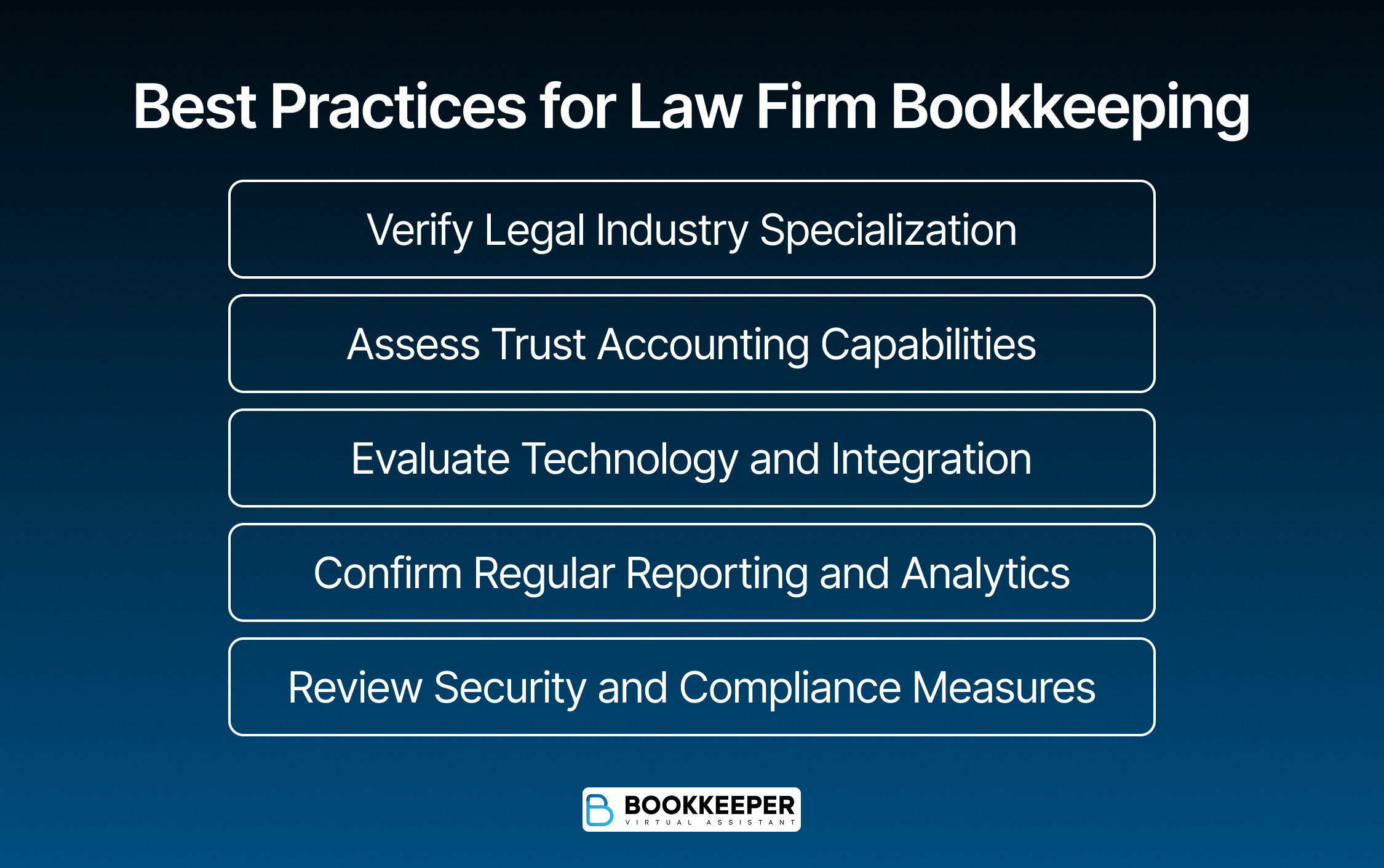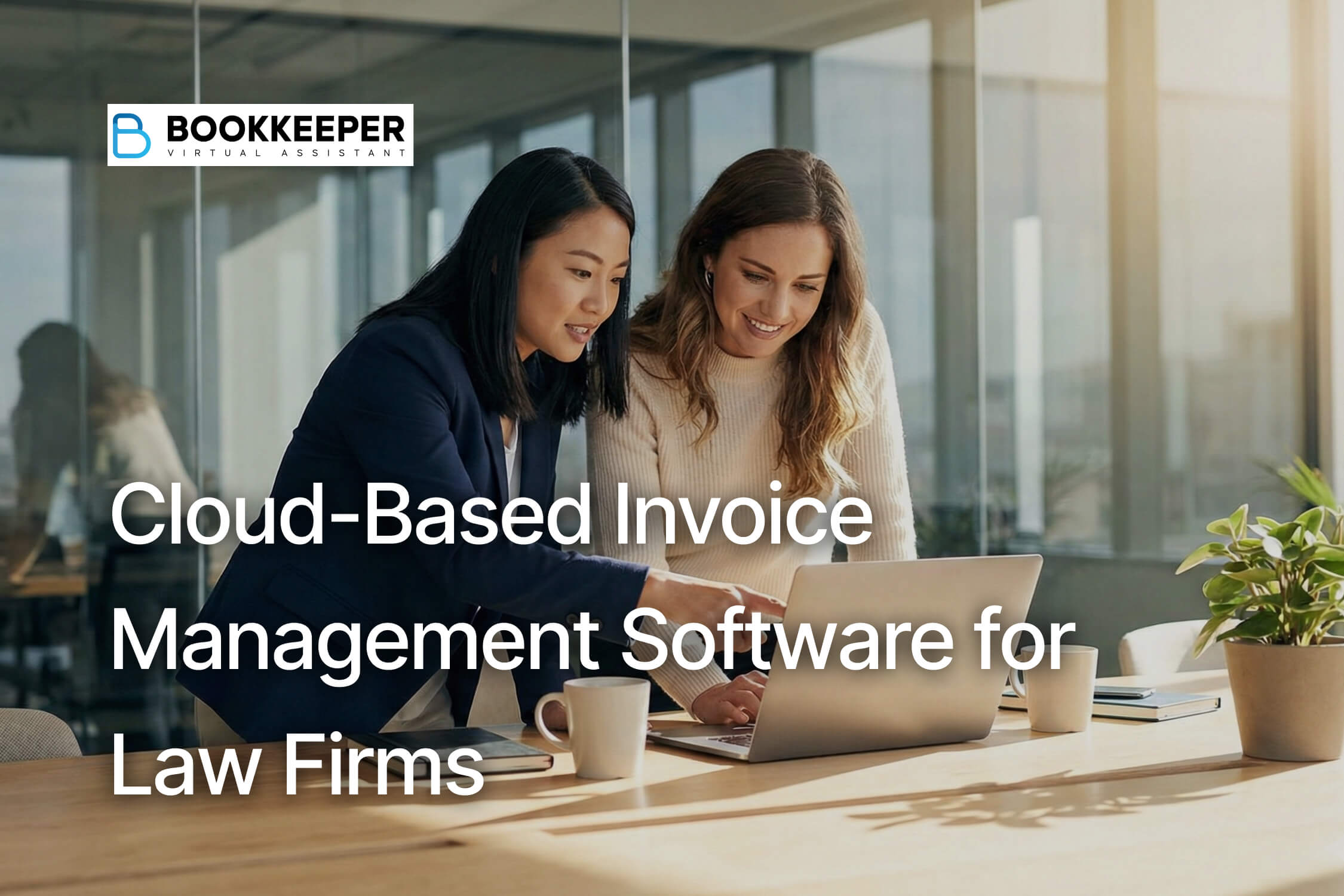Law firm bookkeeping isn't just about tracking numbers; it's about protecting your license and your livelihood. Trust account violations remain one of the most common reasons attorneys face disciplinary action from state bars, with even minor bookkeeping errors potentially resulting in sanctions. Meanwhile, 77% of small law firms report spending excessive time on administrative tasks instead of practicing law. The need for specialized bookkeeping isn't optional, it's essential.
The right law firm bookkeeping solution transforms financial chaos into strategic clarity. This guide breaks down what to look for, which services deliver real value, and how to choose a provider that understands the high-stakes world of legal accounting.
What is a Law Firm Bookkeeping Solution?
A law firm bookkeeping solution is a specialized service designed to manage the unique financial requirements of legal practices. Unlike general bookkeeping, these solutions understand the critical distinction between operating accounts and trust accounts, IOLTA compliance, and legal industry billing complexities.
Professional law firm bookkeeping solutions include trust account management, accounts receivable tracking, financial reporting for legal-specific metrics, expense allocation by client matter, and compliance monitoring. These services are delivered through virtual bookkeeping professionals, cloud-based software designed for law firms, or a combined platform approach.
Best Practices for Choosing a Law Firm Bookkeeping Solutions
Before selecting a bookkeeping solution, evaluate your firm's specific needs. The right solution should feel like a seamless extension of your practice.

Here are five important factors to consider:
1. Verify Legal Industry Specialization
Choose a provider with demonstrated expertise in legal accounting. Law firms face unique challenges, including trust accounting rules, IOLTA compliance, and state bar regulations. Ensure your solution employs bookkeepers who understand Rule 1.15 of the ABA Model Rules and your state's trust account requirements.
2. Assess Trust Accounting Capabilities
Your bookkeeping solution must support three-way reconciliation processes. Trust account violations consistently rank among the leading causes of attorney discipline across state bars, with consequences ranging from fines to disbarment. The right solution minimizes this risk through systematic compliance and detailed record-keeping.
3. Evaluate Technology and Integration
Modern law firm bookkeeping requires cloud-based solutions that integrate with existing software. Your solution should work seamlessly with platforms like QuickBooks or Clio, eliminating duplicate data entry and providing real-time access to your financial data from anywhere.
4. Confirm Regular Reporting and Analytics
Ensure the provider offers regular reports on billable versus non-billable hours, accounts receivable aging, and profit and loss statements formatted for legal industry standards. Access to real-time financial insights helps you make informed decisions about firm profitability and growth.
5. Review Security and Compliance Measures
Verify your solution uses bank-level encryption, secure data storage, and proper confidentiality protocols. Ask about compliance certifications, backup procedures, and disaster recovery plans to protect sensitive client financial information.
Is Professional Bookkeeping a Great Option for Law Firms?
For most law firms, professional bookkeeping solutions represent one of the highest-impact decisions for financial health and compliance. The combination of specialized expertise, time savings, and risk reduction typically delivers returns exceeding the investment.
Law firms handling trust accounts face particularly high stakes. A single bookkeeping error can result in state bar complaints, financial penalties, or license suspension. Professional bookkeepers trained in legal accounting implement processes that prevent violations before they occur.
The time savings alone justify the investment. Legal professionals report that proper bookkeeping tools save 1-10+ hours per week per attorney. For a firm billing at $300 per hour, reclaiming just five hours weekly translates to $78,000 in additional annual revenue per attorney.
Beyond immediate benefits, professional bookkeeping provides the foundation for strategic growth. Accurate financial data allows firms to identify profitable practice areas, understand which cases generate the best returns, and make data-driven decisions about hiring and expansion.
3 of the Best Law Firm Bookkeeping Solutions
We've compiled a list of top providers you can explore immediately.
1. Bookkeeper.law

This may sound biased—but it's not. Bookkeeper.law earns its position because it's the only provider on this list focusing exclusively on law firms. Our team consists of virtual bookkeepers and accountants specializing in legal accounting, trust account management, and QuickBooks expertise.
Our platform provides complete visibility into bookkeeping activities, allowing real-time trust account monitoring and report generation for informed decision-making. With CPAs on staff and 2-3 years of trust law experience, our team delivers the precision your firm requires.
2. Legal Soft

Legal Soft offers a broad range of support services for law firms, including financial management solutions. As our parent company, Legal Soft has assisted over 1,000 law firms nationwide in scaling operations.
3. QuickBooks with Legal-Specific Integration

QuickBooks remains the industry standard, with 70% of law firms using web-based accounting software. When configured with legal-specific add-ons like trust accounting modules, QuickBooks provides a powerful foundation for financial management.
What Bookkeeping Services Can Law Firms Outsource?
When considering professional bookkeeping solutions, you'll find a comprehensive range of services available. Here's an overview of common functions law firms can delegate:
- Trust Account Management - Professional monitoring of IOLTA accounts with three-way reconciliation that verifies bank statements against trust ledgers and client balances. Ensures compliance with state bar regulations and prevents violations leading to disciplinary action.
- Accounts Receivable - Systematic tracking of outstanding invoices, aging analysis, and professional follow-up on overdue accounts. Maintains client relationships while encouraging timely payment.
- Billable Hour Tracking and Analysis - Monitoring billable versus non-billable hour ratios, identifying time leakage, and providing insights to improve profitability.
- Financial Statement Preparation - Creating monthly or quarterly profit and loss statements, balance sheets, and cash flow analyses formatted for law firms.
- Expense Categorization and Allocation - Properly categorizing business expenses and allocating costs to specific client matters for accurate billing and tax deductions.
- Payroll Processing - Managing payroll, calculating taxes, filing required reports, and ensuring employment tax compliance.
- QuickBooks Setup and Management - Configuring QuickBooks for legal practice requirements, including trust account setup and practice management software integration.
- Compliance Monitoring and Audit Preparation - Maintaining records that satisfy state bar audits, monitoring for compliance issues, and preparing documentation for regulatory reviews.
Pros and Cons of Law Firm Bookkeeping Solutions
Pros
- Reduced Compliance Risk: Specialized legal bookkeepers prevent violations that lead to disciplinary action. With 10% of attorneys facing discipline for trust account issues, this protection justifies the investment.
- Time Recovery: Legal professionals save 1-10+ hours per week with proper bookkeeping solutions, redirecting time to billable work and increasing revenue.
- Financial Clarity: Professional bookkeeping provides accurate reports revealing true profitability and supporting strategic decisions.
- Cost Efficiency: Eliminates the expense of hiring and managing in-house staff while providing specialized expertise.
- Scalability: Handles increased transaction volume as your firm grows without additional hires or infrastructure.
Cons
- Initial Learning Curve: Transitioning requires time to establish processes and train your team on new workflows.
- Dependency on External Provider: Relying on an outside service means trusting another party with financial information. However, providers like Bookkeeper.law offer platforms with real-time monitoring for full visibility.
- Cost Considerations: Professional services represent an ongoing expense. Firms must evaluate whether time savings and risk reduction justify the investment—for most, the ROI is substantial.
Build a More Profitable Practice with Professional Bookkeeping
The path to a more profitable law firm doesn't always require more cases or higher rates. Sometimes, the biggest impact comes from optimizing the systems that support your legal work.
Professional law firm bookkeeping solutions transform administrative time into client service time. They replace worry about trust account compliance with systematic processes that protect your license. They convert incomplete financial data into actionable insights that drive better decisions.
When you're confident in your financial management, you can focus on what matters most: delivering exceptional legal services and building a practice that supports your professional and personal goals.
Partner with Bookkeepers Who Understand Legal Nuances
Ready to eliminate trust account stress and reclaim billable hours? Bookkeeper.law offers law firm-specific bookkeeping with CPAs trained in legal accounting. Our platform provides real-time visibility into your finances, while our team ensures compliance with state bar regulations. Book your consultation, and let’s discuss how we can build a more profitable practice together.





